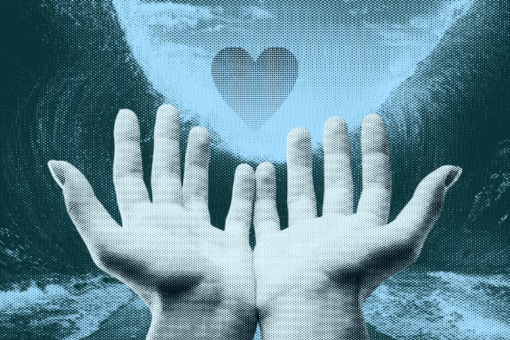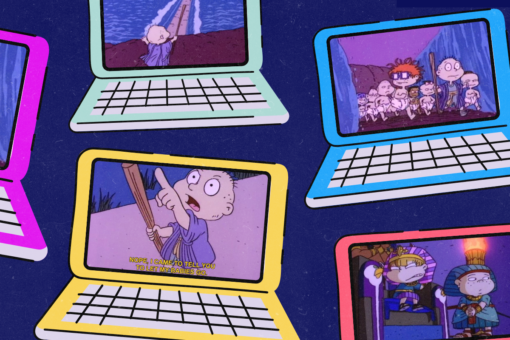So. It’s been a bit of a rough patch. Even if we set aside the insanity that is our 2020 political nightmare, the day-to-day challenges of job/family/dating/bills/fun(?)/laundry/climate change/etc., there’s that… other thing.
Yes. I am talking about COVID-19, the virus you already definitely know too much about. Scared? Me too. Skin rough from all the handwashing? Ditto. Having trouble focusing on everything else when everything else keeps getting canceled? Same.
We don’t know how this is going to end. We don’t know who will get it, how many will die, and how much our lives will change in response. Now, I’m not a doctor, epidemiologist, sociologist, or psychologist. I’m a rabbi. I’m someone who does a lot of thinking about how to hold communities in moments of joy, fear, and pain — and, often, how to hold communities experiencing multitudes.
I’m also someone who gets anxious, especially about health. In fact — not gonna lie — I’m anxious right now. What if I have the virus? What if my parents — in good health but in their 60s — contract it? What about my grandparents in their 80s and 90s? What about everyone else? I don’t think, in a global moment unprecedented for our time, anxiety is unreasonable. I do think it’s easily taken to excess. So here, for me and for you and for all of us, are seven ways to remember to breathe in a world that is shaking.
1. Keep something normal.
What’s a simple daily routine you care about? Every night at about midnight, we learn in the Talmud, King David woke up to study. Every morning, I wake up and make coffee. (Same same, right?) Water in the kettle. Good quality beans into the grinder. Aeropress. Half and half. For you, that simple moment might be washing your hair, texting your sister after work, or listening to The Daily. Keep that up, even if everything else feels off. Good times and bad, some things should stay the same.
2. (Re)connect.
We haven’t had a pandemic in the United States since the internet changed everything. On the one hand, it means when something bad happens, we know immediately. On the other hand, it means we can be in touch with people easily even when stuck at home. So I have a challenge for you: This is a time to expand your social circles, make acquaintances into friends, and refresh relationships that have gone stale.
Talk to your closest connections, of course. But also, take a risk. A safe one. Text your college roommate and have a FaceTime date. (It’s not like you have the excuse of no time for the sixth month in a row.) That person from your yoga class you follow on IG? Message them and set up a time to do a yoga video together in your separate apartments. Just don’t use your spare time to google “corona virus symptoms” for the 27th time.
3. Gather virtually.
We need group connection, too. Many synagogues and other Jewish communities have started to livestream services, classes, and other events. More will follow. Lab/Shul, where I work, will be meeting entirely online for at least the next month. We already host a weekly Virtual Kaddish, where people call in from all over to speak about loved ones and connect with others in mourning. Virtual prayer is a different sort of experience, but it truly can be meaningful.
How does this meet you? If you’re someone who’s part of a community that doesn’t livestream, it’s a chance to explore other communities. If you’re someone who shies away from the Jewish community, use this to test the waters. It’s a lot less scary to sign onto a livestream than to walk into a synagogue. For communities only meeting virtually right now, you’ll be an important part of the gathering, not an afterthought to those in the sanctuary. Risk it. Best case, you’ll be excited to go to synagogue in person when services resume. Worst case, you’ll shut it off after five minutes and spend two hours deciding what to watch on Netflix.
4. Put down your screens.
I know. I just said FaceTime everyone and go to temple online, but it’s all about balance. Especially for those of us who live alone, much of our lives are tied to our computers, tablets, and phones. But, especially with cancelled events leading to more time at home, it’s important to put the screens down.
And what should you be doing instead? I can’t tell you exactly. You know what your hobbies are, or would be if you had time for them. That time you’re not spending commuting? Use it for that. I’m going to write actual letters to friends in Brooklyn (where I live!) and in The Gambia and everywhere in between, I’m going to cook more, and I’m going to practice guitar.
5. Remember everything else awesome and awful going on.
Gratitude is great. We know this. So, yes, remember good things happening in the midst of the crazy. Get excited that you’re presenting (virtually) at that conference next week. Post pictures from Purim. If you’re lucky enough to be financially stable and not an hourly worker, or someone in the gig economny, hold that blessing tight. It’s an act of resistance to find joy when the world is in a state of disarray.
The flipside might seem counterintuitive. Why would you want to think about Haman in the White House, your friend’s terrible breakup, the crisis at the border, or the impact of this very virus on anti-Asian racism? Because COVID-19 is not an isolated incident. This virus, and the lack of effective response in the United States, is a reminder of the interconnectedness of our world. It’s a sacred act to donate to organizations helping those in need, to continue to engage in advocacy, and to remember — every day — just how much our broken healthcare system is harming Americans impacted by this virus. Angry? Good. We should be. We need to act on it now and after things return to whatever version of normal we’ll find.
6. Think about the story you’ll tell.
We’re a people with stories — some miraculous and others horrifying, some entirely factual and others sacred myth. Think about the Exodus. The Inquisition. The Holocaust. Creation itself. This, one day, will be a story worth telling. It’s hard to see that when we’re all in the middle of it. In the book of Deuteronomy, Moses started to review his own story and his people’s story, telling it again, a little differently than when it was happening in real time. How can you tell the story of this moment? Whether you journal, create art, or just talk about your experiences with a friend, you are your own holy narrator, and your story of this experience is worth telling. That includes your feelings: your anxiety, your anger, your grief, and your uncertainty about how this will all end. Remember that you are a storyteller because, one day, someone is going to ask you what this time was like.
7. Breathe.
Yeah. I had to. But really. Stop reading this article for 10 seconds. Shut your eyes. Notice where your feet are. Plant them. Place your hands apart from each other so you stop picking at your cuticles. Take a breath. Slow. Slower. Take another. Roll your shoulders a little and loosen your neck. Did you yawn? Good. It’s working. Do this every hour. Set a reminder on your phone. Really.
Remember: We’re all figuring this out as we go. So be patient, with yourself and with your communities and — please — with your clergy. This is new. This is not easy. But I am not alone, and neither are you. Want to talk? My inbox is open. Now go wash your hands. Don’t touch your face. Breathe. You got this.
Image by oxygen/Getty Images



